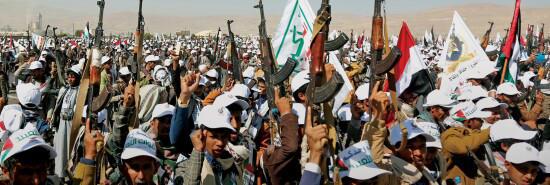
Iran is providing Houthis key ‘tactical intelligence’ for Red Sea attacks
Tehran is enabling the Houthis’ attacks in Red Sea waterways by providing them with essential intelligence for those missions, according to the National Security Council.
Iran’s support for the Yemen Shia Islamist rebel group has been years in the making. However, President Joe Biden’s administration provided details on Dec. 22 of their involvement in the attacks against commercial vessels largely in the Bab el-Mandeb Strait. The narrow passageway leads into the Red Sea and the Suez Canal, and separates Yemen from Eritrea and Djibouti on the waterway’s African side.
In recent weeks, the Houthis have launched more than 100 one-way drones and ballistic missile attacks targeting at least 10 merchant vessels. In one particular incident on Nov. 19, they took the international crew of 25 people on the merchant vessel Galaxy Leader hostage, and they remain held in Yemen.
“We know that Iran was deeply involved in planning the operations against commercial vessels in the Red Sea. This is consistent with Iran’s long-term material support and encouragement of the Houthis’ destabilizing actions in the region,” National Security Council spokeswoman Adrienne Watson told the Washington Examiner. “Iranian support to these Houthi operations remains critical. We know the intelligence picture which the Houthis use to operate in the maritime space is reliant on Iranian-provided monitoring systems.”
Iran has provided advanced weapons systems to the Houthis including drones, land-attack cruise missiles, and ballistic missiles since 2015 that have been used in these attacks, she added. Watson said they have found near-identical features — including a landing skid under the main airframe, a V-style tail wing, an air data collector on the nose cone, and flight control surfaces on the ends of the wings — between known Iranian drones and ones used by the Houthis this fall.
“Moreover, Iranian-provided tactical intelligence has been critical in enabling Houthi targeting of maritime vessels since the group commenced attacks in November,” Watson added.
Anywhere between 10%-15% of global shipping goes through these waterways that the Houthis have now made unsafe for shipping companies, Pentagon press secretary Pat Ryder said. Oil firm BP, Maersk, Hapag-Lloyd, and CMA CGM have all separately announced their intent to pause shipping through the Red Sea due to the threat.
The U.S. military has not conducted any strikes against the Houthis since these attacks ramped up, though American naval vessels in the region have responded to distress calls from attacked vessels and have shot down drones headed in their direction. The two most recent former commanders of U.S. Central Command, which is responsible for the Middle East, have said they believe the U.S. military should respond with force.
“I think the thing I’ve learned the most is that we have to strike back at the Houthis and get this behavior back in control,” retired CENTCOM leader Joseph Votel, who served from 2016 to 2019, told the Washington Examiner. “When you see companies like Maersk and BP stopped shipping through the Red Sea and down through the Bab el-Mandeb [Strait], that’s pretty significant.”
The U.S. has spearheaded a new task force, dubbed “Operation Prosperity Guardian,” that will protect commercial vessels while they transit these waterways, though it’s considered “defensive” in nature.
The task force, which Secretary of Defense Lloyd Austin announced on Dec. 18, will be led by the Combined Maritime Forces umbrella and the leadership of Task Force 153, which is focused on Red Sea security. Ryder described it as a “defensive coalition” and compared their role to “highway patrol” designed to “safeguard maritime vessels.”
More than 20 countries have agreed to participate in the international effort, but some of the participants have declined to be named publicly in the effort. Their collective demurral reflects the political sensitivity of the perception of aligning with the U.S., and by extension Israel, the purported target of the attacks by the Houthis.
Bahrain is the only publicly identified Middle Eastern country involved in the operation, though more could be among the still-anonymous participants, and Bahrain does not border the waterways currently at risk. Ryder declined to say whether any other Middle Eastern country was involved, telling reporters, “We will defer to individual countries within their level of comfort to talk about their participation in this coalition.”
In response to the U.S.-led operation, Mohammed Albukhaiti, a member of the Houthis’ ruling council, told the Washington Post, “Our war is a moral war, and therefore, no matter how many alliances America mobilizes, our military operations will not stop,” while Abdel-Malek al Houthi, another leader of the group, said they would target American battleships if the U.S. took military action in Yemen.
Similarly, Iranian Defense Minister Mohammad Reza Ashtiani said prior to the announcement of the task force that if one were to be stood up, it would create “extraordinary problems.”
The Houthis’ attacks began in the time since Hamas’s Oct. 7 terrorist attacks in Israel that left roughly 1,200 people dead, the vast majority of whom were civilians. Israel, in the aftermath of the worst terrorist attack in the country’s history, announced their intent to remove Hamas from power in Gaza and demilitarize the terrorist group. The subsequent war has resulted in the deaths of nearly 20,000 Palestinians, according to the Hamas-controlled health ministry, a figure that does not differentiate between civilians and combatants.
The U.S. continues to support Israel despite public and private rhetoric encouraging Israel to do more to prevent civilian casualties, which has put it at odds with many countries in the Middle East, allies and foes alike.
Source » msn





